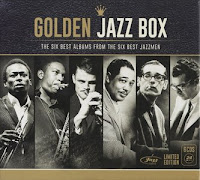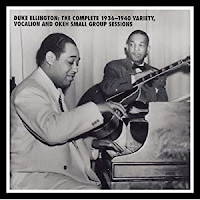Son of the Blues, Jazz is one of the deepest expressions in music. With
improvisation as its foundation, the genre includes multiple artists
that are embedded in gold letters in the history of popular music.
Golden Jazz Box is a celebration of that legacy, presenting the 6 best
albums of each one of the genre's biggest icons: Miles Davis, John Coltrane, Chet Baker, Dave Brubeck, Bill Evans and Duke Ellington.
Golden Jazz Box works as a true musical encyclopedia, the definitive collection of these wonderful singers in one six-CD box. Golden Jazz Box is a fantastic album, suitable for any moment and mood and an opportunity to get closer to these timeless artists.
Golden Jazz Box works as a true musical encyclopedia, the definitive collection of these wonderful singers in one six-CD box. Golden Jazz Box is a fantastic album, suitable for any moment and mood and an opportunity to get closer to these timeless artists.














